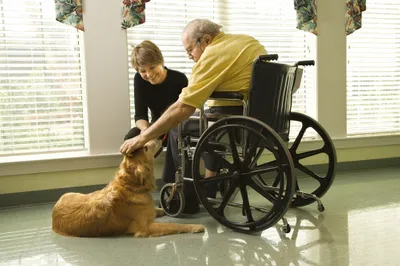Dogs are considered human’s best friend.
But aside from the obvious loyal companion perks; our furry, four-legged friends provide many little known health benefits—that range from lowering the risk of heart disease to heightening immune strength.
So here’s to giving a much-deserved scratch behind the ears to our lovable Dalmatians, loyal Labrador retrievers, pint-sized poodles, and every mutt in between for the following health advantages of ownership…
1. Owning a Dog Keeps You Fit
The next time you take Fido for his nightly stroll, you might want to thank him for the calorie-burning bonuses on your end. Studies consistently show that dog owners tend to get more exercise than their canine-free counterparts. After all, many people get a dog in order to have a jogging motivator or just to get outside more often. Now that alone is worth a few sloppy licks to the face.
2. Dogs Sniff Out Cancer
It’s one thing when Barney follows his nose to the food dish, but his incredible olfactory prowess is so impressive that he can actually sniff out several forms of cancer in human beings. In fact, most mutts are credited with over 90-percent accuracy when it comes to differenciating lung cancer patients from healthy people in group settings.
3. Dogs Deter Heart Disease
The American Heart Association claims a few extra treats are in order for Fido! Why? Well it turns out that in addition to dog owners getting more physical activity, having a precious pooch actually lowers your levels of stress as well. Don’t take it from me. Just ask anyone who owns a dog how calming it is to come home to a happy face after a terrible day at work.
4. Dogs Can Be Trained to Predict Seizures
Turns out Niagara Falls, the Grand Canyon, and dogs have something in common—they’re all mystic wonders of our world. Before you guffaw at your proud pooch, consider ongoing health studies at the Children’s Epilepsy Center at Children’s Healthcare in Atlanta that pair epileptics with seizure alert dogs who can sense and warn their masters of an upcoming seizure 45 minutes prior to an attack.
5. Canines Heighten Immune Strength in Children
You might frown on little Joey crawling around on the floor with Missy the Miniature Schnauzer, but studies show that dog is doing your child a serious health service when it comes to strengthening his immunity. In reality, kids who frolic with a family dog, suffer from fewer colds, allergies, and ear infections due to healthy germ exposure.
6. Happiness is Bringing Your Dog to Work
The International Journal of Workplace Health Management recently released a study on the benefits of bringing your four-legged friend to work. Findings uncovered that when workers were permitted to bring Bowser to the office, they suffered less overall work stress. In fact, the office as a whole was a much happier place to spend the day.
7. Detect Low Blood Sugar
Epileptics aren’t the only patients who can benefit from a service alert dog. Diabetics can be alerted to low blood sugar by a dog’s powerful snout as well. Dogs can be trained to sniff out the invisible scent of a diabetic experiencing hypoglycemia, or low blood sugar, and alert the individual or bark for help in an emergency situation.
8. Dogs Can Heal Boo-boos
Dog owners will attest to the healing powers of a sloppy lick. However, doggie kisses actually contain natural ingredients in their slobber that stimulate nerves, get oxygen circulating, and heal broken skin capillaries.
9. Dogs Combat the Effects of Depression
A happy dog waiting for you at the door can banish a tedious office day and even help you heal after a painful breakup. But it turns out dogs can combat the effects of chronic depression as well. Research shows that dog owners who suffer from bouts of depression benefit greatly from the unconditional love, need, and acceptance of a loving pet.
10. Dogs Soothe Symptoms of Autism
For children with autism, the world can be a scary, stress-inducing, and perplexing place. However, medical experts consider the consistent love and attention of a dog very beneficial in autistic households because furry friends can actually help reduce and soothe the secretion of cortisol (or stress hormone).
11. Dogs Comfort Dementia Patients
As we age, the loss of control over our personal independence can be infuriating. However, seniors suffering from dementia have benefited largely from dementia dogs. These happy canines make visits to senior’ hospitals and residences to ease frustration, offer support during medical check-ups, and comfort those who have little control over their own lives.
12. Dogs Offer Human Compassion
You can always count on your dog to comfort you when you’re sick or upset…oftentimes more so than your children or spouse. When canine compassion was observed at Goldsmiths, University of London, the study found that dogs were more apt to snuggle with a distressed person vs. a content individual—proving that you can always count on your furry best friend.
















